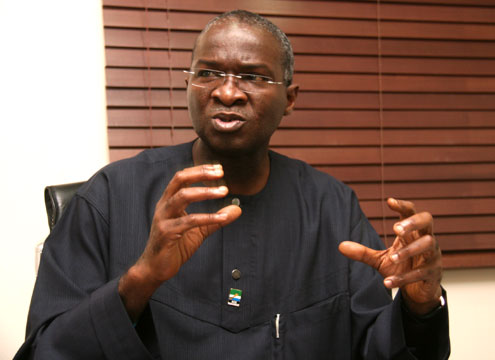The Minister of Power, Works and Housing, Mr Babatunde Fashola, has called for systematic approach in ensuring proper project costing to tackle high cost of projects and corruption in the construction sector.
Fashola made the call at the 2017 Annual National Project cost Reduction Summit organised by the Quantity Surveyors Registration Board of Nigeria (QSRBN) on Thursday in Abuja.
The Summit has the Theme: “Fighting Corruption through Proper Project Costing in Nigeria’’.
The Minister, who was represented by Mr Sani Gidado, Director Public Building and Housing, Federal Ministry of Power, Works and Housing, said this would guarantee availability of more funds for the development of infrastructure.
“The economy will be enabled to appropriate the maximum benefits from this strategic sector by ensuring efficient allocation and utilisation of resources in this manner.
“All stakeholders have a duty to ensure value for money through proper projects costing in this all pervasive sector’’.
Fashola said that one of the root causes for high costs of projects in the construction sector was corruption in the form of deliberate inflation of cost to satisfy pecuniary interests.
According to him, decayed infrastructure is one of the indices of underdevelopment that corruption promotes in a nation.
“The construction sector is one of the most important in any economy because of the profound effects of the activities of that sector on the overall national economy.
“Apart from its known capacity to generate employment on a large scale, its huge multiplier effect on the economy stand it out as one of the leading sector of economic development.
“Not only is it capable of pulling an economy out of recession; it is always handy in reflating a depressed economy’’ he said.
The Registrar, QSRBN, Mr Godson Moneke, said that the costs of constructing projects in Nigeria are rated among the highest compared to other countries in the world.
He said that corruption and lack of patriotism have caused Nigeria to lag behind her peers in all indices of development, industrial product and human-centred development.
“Our hearts bleed for Nigeria when we watch with amazement as monies which could achieve three units of projects achieve only one, while the rest are shamelessly diverted for fraudulent appropriation.
“To stem this anomaly, QSRBN is in the fore front of advocating the establishment of costing templates for all categories of construction projects across Nigeria.
“Such templates should create a cost bands/ranges for roads, bridges, railways, public buildings housing projects among others showing central tendencies, environmental zones and geological zones’’.
Moneke said that the summit was a way out of corruption which was induced by inflated project cost in the construction industry.
According to him, the summit was aimed at bringing some sanity into this important sector so that it can play its rightful role as a leading sector of economic development.
In his speech, Prof. Femi Odekunle, Member, Presidential Advisory Committee Against Corruption (PACAC), said that in the current fight against corruption, the QSRBN should be commended for conceiving and executing this summit on corruption.
He said that the committee’s engagement with professional bodies was justified by the fact that in this country many professionals are collaborators in the perpetration of medium–to-large-scale corruption.
“In actual fact, and perhaps needless to say, there is hardly any instance of such corruption that could succeed without the collaboration of a surveyor, architect and engineer before or after the fact,’’ he Odekunle. (NAN)
UU/AFA

